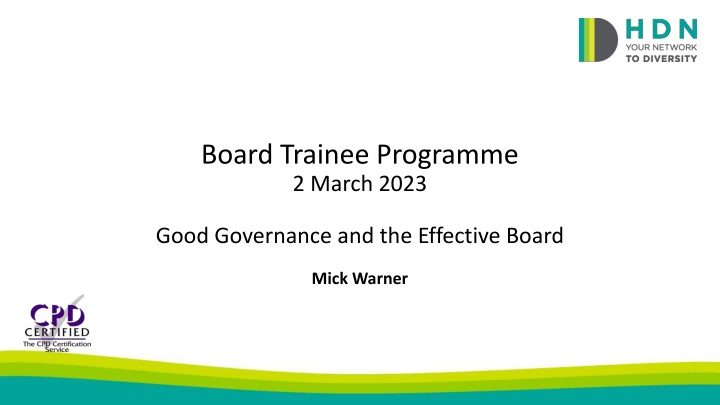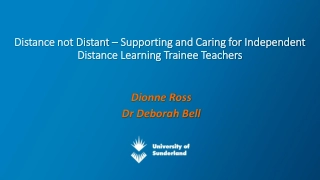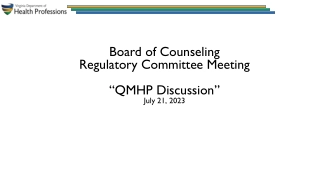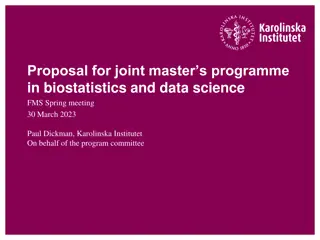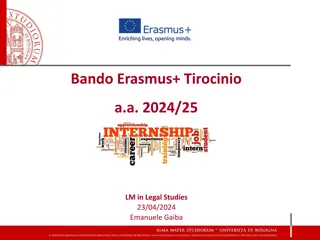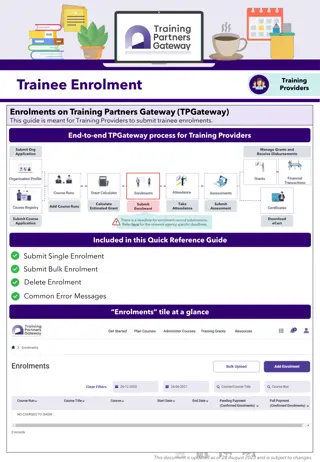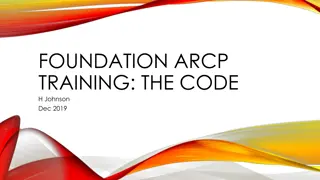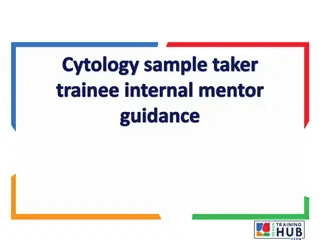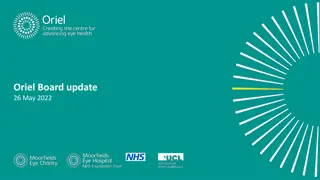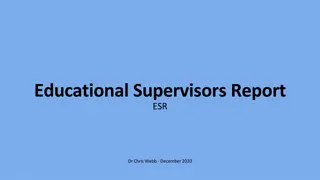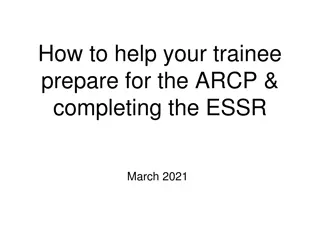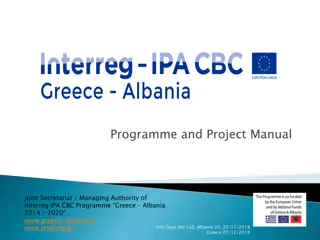Board Trainee Programme
Governance plays a crucial role in managing organizations effectively. Learn about the definition of governance, benefits of good governance, different modes of governance, and more, including how boards can fulfill their fiduciary and strategic roles. Understanding these concepts is essential for promoting ethical behavior, managing risks, and ensuring accountability within an organization.
Download Presentation

Please find below an Image/Link to download the presentation.
The content on the website is provided AS IS for your information and personal use only. It may not be sold, licensed, or shared on other websites without obtaining consent from the author.If you encounter any issues during the download, it is possible that the publisher has removed the file from their server.
You are allowed to download the files provided on this website for personal or commercial use, subject to the condition that they are used lawfully. All files are the property of their respective owners.
The content on the website is provided AS IS for your information and personal use only. It may not be sold, licensed, or shared on other websites without obtaining consent from the author.
E N D
Presentation Transcript
Board Trainee Programme 2 March 2023 Good Governance and the Effective Board Mick Warner
Overview A definition of governance Benefits of good governance Modes of governance Regulatory expectations NHF Code of Governance 2020 Effective Board meetings Learning from problem cases
A definition of governance Governance is a system that provides a framework for managing organisations. It identifies who can make decisions, who has the authority to act on behalf of the organisation and who is accountable for how an organisation and its people behave and perform Chartered Governance Institute UK & Ireland
Benefits of good governance Organisations that have good governance: Use clear decision making processes Behave openly by reporting on their activities and actively engage with their stakeholders Effectively manage the risks they face and take responsibility for controlling and protecting their assets, including their reputation Uphold ethical standards, are good employers and are mindful of their environmental impact Chartered Governance Institute UK & Ireland
Modes of governance Boards govern in three distinct modes. Each mode serves important purposes, and together, the three add up to governance as leadership: The fiduciary mode of governance The strategic mode of governance The generative mode of governance Governance as Leadership: Reframing the Work of Nonprofit Boards, Richard P. Chait, William P. Ryan, Barbara E. Taylor, 2005
The fiduciary mode of governance In the fiduciary mode, the board s central purpose is the stewardship of tangible assets, and its principal role is to act as a sentinel. It oversees operations and ensures efficient and appropriate use of resources, legal compliance and fiscal accountability
The strategic mode of governance In the strategic mode, the board s central purpose is to ensure a winning strategy for the organisation, and its principal role is to be a strategic partner to senior management. Its core work includes setting priorities, reviewing and modifying strategic plans, and monitoring performance against plans
The generative mode of governance In the generative mode, the board s central purpose is to be a source of leadership for the organisation, and its principal role is as a sense maker framing the situation. The board decides what to decide , discerns challenges and opportunities, and probes assumptions, logic and the values behind strategies
Regulatory expectations 1 Required outcome Registered providers shall ensure governance arrangements that deliver their aims, objectives and intended outcomes for tenants and potential tenants in an effective, transparent and accountable manner. Governance arrangements shall ensure registered providers: Adhere to relevant law Comply with their governing documents and all regulatory requirements Are accountable to tenants, the regulator and relevant stakeholders
Regulatory expectations 2 Required outcome (continued) Safeguard taxpayers interests and the reputation of the sector Have an effective risk management and internal controls assurance framework Protect social housing assets
Regulatory expectations 3 Specific expectations Registered providers shall adopt and comply with an appropriate code of governance. Governance arrangements should establish and maintain clear roles, responsibilities and accountabilities for the board, chair and chief executive and ensure appropriate probity arrangements are in place. Areas of non-compliance with their chosen code of governance should be explained. Registered providers should assess the effectiveness of their governance arrangements at least once a year Registered providers shall ensure that they manage their affairs with an appropriate degree of skill, independence, diligence, effectiveness, prudence and foresight
Regulatory expectations 4 Specific expectations (continued) Registered providers shall communicate in a timely manner with the regulator on material issues that relate to non-compliance or potential non-compliance with the standards Registered providers shall ensure that any arrangements they enter into do not inappropriately advance the interests of third parties, or are arrangements which the regulator could reasonably assume were for such purposes Registered providers shall communicate with the regulator in an accurate and timely manner. This includes returns to the regulator, including an annual report on any losses from fraudulent activity, in a form determined by the regulator
Regulatory expectations 5 Specific expectations (continued) Registered providers shall assess their compliance with the Governance and Financial Viability Standard at least once a year. Registered providers boards shall certify in their annual accounts their compliance with this Governance and Financial Viability Standard Registered providers which are parent companies shall, as appropriate, support or assist those of their subsidiaries that are registered providers with a view to ensuring compliance with regulatory requirements
NHF Code of Governance 2020 Four principles underlie the NHF Code of Governance 2020 1. Mission and values 2. Strategy and delivery 3. Board effectiveness 4. Control and assurance Code of Governance 2020, National Housing Federation, November 2020
Principle 1: Mission and values The board sets and actively drives the organisation s social purpose, mission, values and ambitions, and through these embeds within the organisation resident focus, inclusion, integrity, openness and accountability Mission Resident focus Equality, diversity and inclusion Culture Integrity Accountability Reputation and trust
Principle 2: Strategy and delivery 1 The board sets ambitions, plans and strategies which enable the organisation to fulfil its social purpose and remain viable and sustainable, and exercises demonstrable and effective oversight of its delivery Strategy, resources and plans Structures Working with others The chief executive Workforce Performance
Principle 2: Strategy and delivery 2 Group structures Joint ventures and partnerships
Principle 3: Board effectiveness 1 The organisation is led by a skilled and diverse board which regularly reviews and capably manages its own performance and effectiveness, and ensures that it complies with this code Roles and responsibilities Functions of the board Board composition Board election, selection and appointment Committees Board remuneration
Principle 3: Board effectiveness 2 Tenure and renewal Conduct of business Board performance, review and learning Member appraisal Compliance with this code
Principle 4: Control and assurance The board actively manages the risks faced by the organisation, and obtains robust assurance that controls are effective, that plans and compliance obligations are being delivered, and that the organisation is financially viable Audit Audit committee Risk Compliance Whistleblowing and confidential concerns
Effective Board meetings Timed, manageable agendas for meetings of an appropriate length High quality papers with the right level of detail which Board members have read Clarify issues prior to the meeting Short introductions to papers Appropriate behaviours Inclusive and accessible with everyone contributing (and quorate!) Constructive challenge Make some decisions! and record them
Learning from problem cases 1 Extracts from With the Benefit of Hindsight: Learning from problem cases: volume 4, Homes and Communities Agency (June 2015) In all too many of our cases, Boards have been assured that all was well, when in fact it was not. Or they have simply not been given key pieces of information, nor indeed even asked for them. Brutally unfair as this may sometimes seem, Boards can only blame themselves when this occurs the rogue executive explanation carries little weight in mitigation The quality of challenge a Board can offer is fundamental to the value it can bring. How well this works depends hugely on the nature of the relationship between the Board and executive and of course on the competence of both
Learning from problem cases 2 Boards need to be more than passive respondents to executive agendas, however well- intentioned. To make this happen with require Boards to make time for reflection, informal discussion, early engagement with their executive teams and active connection with other organisations, networks or sources of good practice Excellent governance is not all about being strategic. Of course Boards need to avoid operational entanglement, but they need too a real grip on a wide range of compliance issues gas servicing, data protection, value for money, employment matters, rent setting, covenant compliance
Learning from problem cases 3 Create the conditions for effective challenge: A highly skilled Board is a good start, but not always enough. The right behaviours and a well-designed governance cycle also need to be in place. And behind that a Board culture which allows and enables dissent, challenge and debate. In many of our cases, a Board which had been readier to challenge may have been able to head off the crises long before they became catastrophes
Thoughts? Questions? Comments?
